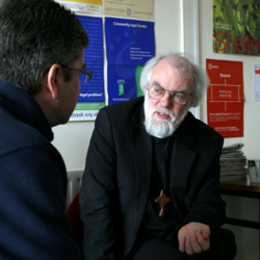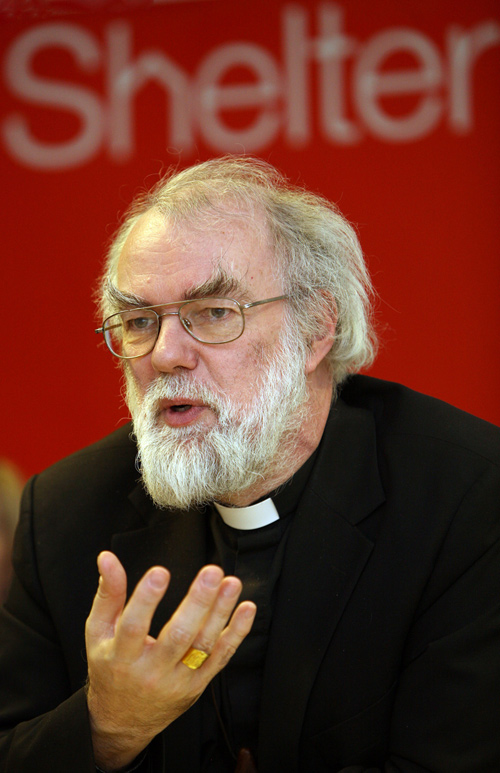'We’re all vulnerable to homelessness' - Archbishop's article in Roof magazine

Thursday 3rd September 2009
Archbishop Rowan Williams has written an article for Roof magazine, the official publication of Shelter, the housing and homelessness charity.Shelter, formed in 1966 from five church housing trusts, works to give advice, information and advocacy to people in housing need. Shelter also campaigns for lasting political change to end the housing crisis for good, and has extended its services to include advice on debt and benefits.
Archbishop Rowan, with Baroness Andrews (Dept for Communities and Local Government), visited a Shelter Advice Centre in Chatham in March 2009 and heard from clients and staff about their experiences of homelessness and bad housing. The Archbishop said that he was "grateful for the opportunity of drawing attention  not just to the first-rate work done locally by the Centre but to the urgent need nationally for more affordable housing and better provision of good and accessible rented homes."
not just to the first-rate work done locally by the Centre but to the urgent need nationally for more affordable housing and better provision of good and accessible rented homes."
The Archbishop's article, published in Roof on 3rd September 2009, follows.
All together now
Forget the stereotypes, we’re all vulnerable to homelessness, says Rowan Williams. Particularly in a recession.
The recession has put homelessness back on the agenda. As the repossession rate has risen, we’ve been forced to acknowledge that homelessness isn’t just a problem for other people – it can and does happen to people like us.
When times are good, it’s easy to slip into stereotypes about homelessness – to assume that ‘the homeless’ are vagrants and undesirables that you deal with mostly by ignoring them, and where necessary providing emergency help to keep them off the streets.
Such attitudes are hard to sustain when the fragility of our economy and the unevenness of levels of social care has been laid bare by the recession. ‘The homeless’ may be students or young workers in temporary accommodation, parents with young families, people whose lives have been turned upside down by illness, or by domestic trauma, a bereavement or the breakdown of a relationship.
For me, a recent visit to a Shelter advice centre in Chatham underlined the challenges confronting vulnerably housed and homeless people – and showed how much their problems are not just due to the absence of long-term secure accommodation, but involve a lot of other issues. Homelessness does not exist in a neat compartment isolated from other things.
The Church has an established track record in helping with ‘ambulance’ work with the long-term homeless. Many parishes operate overnight cold-weather shelter schemes. I had the privilege of visiting one in an area of relative affluence in London where it was hard to imagine that homelessness could be an issue.
But churches have an increasing role in moving beyond this kind of response. One example is the Northampton Hope Centre, a church initiative that has been growing for 35 years, which recently stepped up its meals service and started to offer a range of workshops and other activities, including cookery lessons, along with counselling and therapy.
Another example is the St Petroc’s Society in Penzance, which offers accommodation advice and training and resettlement services as well as subsidised meals. And there are plenty of other examples where local parish churches act as the catalyst for projects that strengthen community co-operation. The 999 Club in Deptford came about after parishioners took the initiative to set up a drop-in centre that has grown into a major local service for advice and care.
The more we recognise the ways in which homelessness is bound in with other issues, social and relational, the better we shall be able to respond.
And I hope that the Church will continue to strengthen its efforts. We’re well placed to translate awareness of the problem into real action, and a commitment to all our neighbours as whole people.
In a parish church community, there will be people who spot what may go under the radar for other groups or agencies. I remember a conversation years ago with someone from a church in South Wales who had been able to tell the local authority exactly how many people were sleeping rough in the town on an average night.
There is local access to a great many sources of contact and informal information, as well as networks of willing volunteers. And churches place a high priority on seeing people whole, not as stereotypes – to avoid thinking that you only need to deal with surface problems or that piecemeal solutions work.
The Church always tries to be aware of the number of dimensions involved in most human problems – and to be slow to think that a simple explanation is adequate. I’d like to think that this attitude underpins the practical work churches undertake with love, so that we are able to make a significant contribution to a better and more imaginative engagement with homeless people – based on a humanity we all share that comes from being, as Christians would say, made in the image of God.
© Rowan Williams 2009
